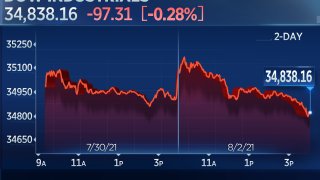
U.S. stocks gave up early gains and turned negative for the session on Monday as concerns about Covid variants and peaking economic growth weighed against strong earnings results.
The Dow Jones Industrial Average fell 97.31 points, or 0.28%, to 34,831.16 and the S&P 500 slipped 0.18% to 4,387.16 with most of the losses coming in the final hour of trading. The Nasdaq Composite clung to a gain of just 0.06% to close at 14,681.07. The Dow touched a new intraday record before losing steam.
Monday's weak performance for stocks came as Treasury yields and oil prices dipped, signaling that some investors may be concerned about economic growth even as earnings results show strength.
Feeling out of the loop? We'll catch you up on the Chicago news you need to know. Sign up for the weekly Chicago Catch-Up newsletter here.
"The markets are having a hard time making up their mind as investors look for the next catalyst in either direction," Canaccord Genuity analyst Tony Dwyer said in a note to clients. "The fear over the Delta variant of the Covid-19 virus and the other side of 'peak everything' has investors on edge, while the monetary and fiscal support for the economy coupled with historically strong earnings keeps liquidity high."
The 10-year Treasury yield fell to around 1.17%, putting it near its recent lows from mid-July. Yields move inverse to prices. The move came as the Institute for Supply Management purchasing manager's index dipped slightly in July, reinforcing some worries about peaking economic growth.
Kathy Jones, chief fixed income strategist at Charles Schwab, said that concerns about slowing growth and the delta variant could be reasons for yields to move lower but still couldn't explain the current level for bonds.
Money Report
"I think the whole world expects yields to move up, and maybe that's why they can't," Jones said.
The U.S. is averaging more than 63,000 new Covid cases a day the last 7 days, according to the latest CDC data, near its highest level since April this year. Local governments and companies have started to impose new rules, including Target requiring masks for workers in high-risk areas and Equinox requiring proof of vaccination for gym members and staff. Officials in the San Francisco area are bringing back mask mandates this week, while New York officials on Monday encouraged people to wear masks indoors, even if they are fully vaccinated.
Shares of travel stocks that could be hit hardest by new health restrictions, including major airlines, moved lower on Monday afternoon. However, the major indexes are still trading near all-time highs even as concerns grow about the delta variant.
"At the end of the day, the stock market is driven by two things: 1) Earnings and 2) Multiples and until COVID (or China) begins to negatively impact one or both of those metrics, stocks can stay resilient,' Tom Essaye, founder of Sevens Report, said in a note.
One source of optimism on Monday came from Washington as senators introduced a bipartisan infrastructure bill over the weekend. The bill includes $550 billion in new spending over five years. That's on top of previously approved funds of around $450 billion.
Senate Majority Leader Chuck Schumer is pushing for the bill to be passed before the chamber goes on recess on Aug. 9. Votes on amendments and a separate budget measure could prove to be hurdles that slow down the timeline for the bill.
Infrastructure stocks, including Caterpillar, jumped when the market opened but turned negative later in the session.
One of the top performers on Wall Street was Square, whose shares rose more than 10% on Monday after Jack Dorsey's payment company reported announced a $29 billion all-stock deal to buy Australian installment loan provider Afterpay. Square also reported its second quarter earnings, saying its gross profit rose 91% year over year and that its Cash App has 40 million monthly active customers.
Automaker Tesla was another bright spot on Monday, with the volatile stock rising 3.3%.
An overall strong earnings season continues to be a tailwind for the market. So far, 88% of S&P 500 companies that have reported have topped EPS estimates, according to FactSet. For the second quarter, the S&P 500 is on track to post earnings growth of 85.1%, which would be the best growth rate since 2009, according to FactSet.
The S&P 500 managed to notch its sixth-straight month of gains in July, although volatility increased amid concerns about the economic recovery in the face of the spreading delta Covid variant. It's the best monthly winning streak for the benchmark since 2018. The Nasdaq Composite and Dow Jones Industrial Average added about 1.2% and 1.3%, respectively, in July, while the broad S&P 500 gained close to 2.3% last month.






